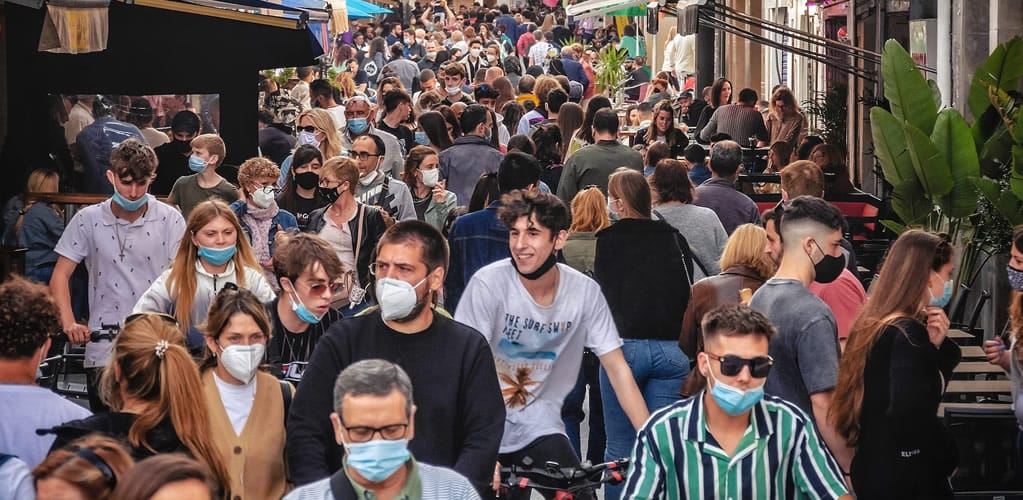Do not ignore COVID, experts say
What health experts think about the current COVID situation, and why getting the winter booster jab and wearing face masks now is important.

What health experts think about the current COVID situation, and why getting the winter booster jab and wearing face masks now is important.
First published: Oct 2022.

Unsplash/Belinda Fewings
Adopt responsible practices now
“The surge in infections is alarming and could easily rise further. Wearing face masks at mass events indoors is a reasonable precaution if the UK is to avoid an even bigger surge in infections.
“With all the other political challenges facing the Government and the pressures on the NHS, the last thing anyone wants is a surge in COVID-19 infections. But these latest figures show a sharp uptick in the virus’s transmissibility and are deeply concerning.
“No one wants to see a return of lockdowns and stringent restrictions. We need to adopt responsible practices to prevent a winter surge and the risk of overwhelming the NHS.
“Reasonable precautions include using face masks in enclosed space, especially at mass participation events; getting tested in case of appearance of even minor symptoms; avoiding socialising in crowded indoor venues; and maintaining adequate social distancing when interacting with vulnerable or immunocompromised individuals.”

|
▫ Denis Kinane, Immunologist, Cell Biologist, Infection, Immunity and Genomics Specialist. Professor at the University of Bern. Co-Founder and Chief Medical Officer at Cignpost Diagnostics Ltd. |

Unsplash/Yoav Aziz
Get the COVID jab
“We’re seeing sustained increases in COVID-19 cases and hospitalisation rates, so we continue to urge those eligible for vaccinations to come forward, whether that’s a first dose or a booster.
“Vaccines are the best protection against severe disease and hospitalisation this winter and it’s never too late to take up your first dose.
“If you are unwell or have symptoms of a respiratory infection, it is particularly important to avoid contact with elderly people or those who are more likely to have severe disease because of their ongoing health conditions.”

|
▫ Dr Mary Ramsay, Director of Public Health Programmes at the UKHSA. |
We can’t ignore COVID
“It looks like the winter wave of infection has begun.
“This was inevitable given that more people are spending time indoors, immunity induced by previous vaccinations and infections is waning and we have new virus variants that are more able to dodge the immune system.
“The UK is facing a soup of sub-variants of the Omicron strain that appear to be more immune evasive.
“Rising cases are very much a concern for vulnerable and older people, but nobody should be complacent about catching the virus.
“Recent data estimates that 2.3 million people in the UK are suffering from long COVID with around 1.1 million of these having been first infected with COVID more than a year ago.
“COVID is not like the flu or a cold – infection can lead to long-term consequences. So everybody needs to be concerned and protect themselves, their families and friends from getting infected.”
“The XBB and BQ.1.1 strains are very worrying as they are two of the most immune evasive versions of COVID that we have seen to date.
“XBB infections have grown very fast in the Indian subcontinent and Singapore.
“Meanwhile, BQ.1.1 infections are rising so rapidly in Europe and North America that this variant is very likely to be the dominant version of the virus in these countries (including the UK) the coming weeks.
“This is a wakeup call — we can’t ignore COVID and need to do everything to protect the elderly and most vulnerable as well as the NHS as we head towards a very challenging winter.”

|
▫ Professor Lawrence Young, Virologist. Cancer Researcher. Professor of Molecular Oncology at Warwick University. |
Flu is coming. Get boosted and your flu jab!
“What’s next depends on whether more immune evasive variants beat out a more immune population (especially with the autumn booster).
“Deaths rose last week in line with the September wave.
“England and Scotland are doing well with the autumn booster campaign, but Wales and Northern Ireland lagging behind.
“In England, over 70% of the 75+ are boosted but only 37% of the 50-64. Everyone over 50 is now eligible, so get boosted!
“A large number of adults are now over 6 months out from their last dose and far too many children are still entirely unvaccinated. So potentially quite a few people are susceptible to a new variant wave out there, although everything is confounded by previous infections and how it adds to vaccination (it depends on the timing of vaccination, the timing of the infection and the variant!).
“There are new more immune evasive subvariants of Omicron out there... A couple of weeks ago in England, they were almost 20% of sequenced cases – at some point, they will make themselves felt. Whether it is big or small, I don’t know.
“Finally, last year we barely had a flu season and we didn’t have one at all during the winter of 2020/21. Flu cases are already higher this year than they were in the 2 winters pre-pandemic. Flu is coming – so please get your flu vaccine too!”

|
▫ Professor Christina Pagel, Director of University College London’s clinical operational research unit, member of Independent Sage. |
More times you get COVID more likely you’ll get Long COVID
“Having COVID multiple times does not build up resistance or immunity because the virus is always changing.
“The more times you get it, the more likely you are to be unlucky and end up with long COVID — which is the thing that none of us want because it can be so serious. It can knock people off their stride for several months.
“We can get ill even though we have been vaccinated. It’s because a few people are likely to be at high risk and also because of the constant worries about long COVID that I think people should still keep their mask in their pocket... or in their handbag, or briefcase.
“If you’re going into a place where there are a lot of people up close together, all the evidence is that that’s where your risks are greatest.
“For many of us now, the illness will be an inconvenience rather than life threatening, but remember there are some who are going to be badly affected.”


|

|

|
— AUTHORS —

|
▫ PMP News reporting. |
Sources
- Text: This piece was originally published in PMP Magazine on 26 October 2022. | The experts write in a personal capacity.
- Cover: Unsplash/Xavi Cabrera. (Licensed under a Creative Commons Attribution-ShareAlike 4.0 International License.)








[Read our Comments Guidelines]